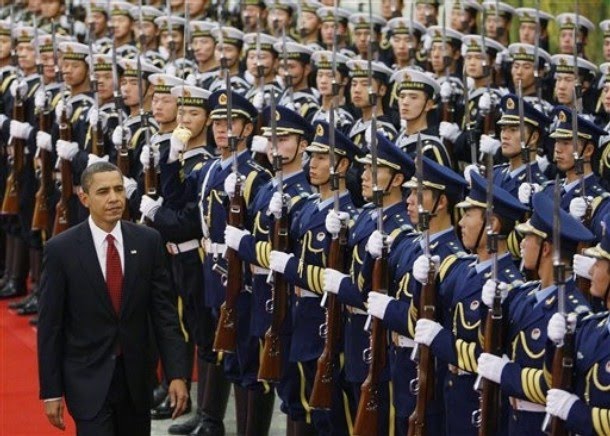
From Robert Manning, Global Times: Eight US presidents from Richard Nixon to Barack Obama have pursued a policy of facilitating China’s economic modernization and integration into the international system.
Indeed, no country benefited more than China from the US security role that has underpinned stability in East Asia and the globalizing economy over the past four decades.
As China launched its reform and opening-up policies, its economy grew from some $202 billion in 1980 to roughly $7 trillion by 2012, as it joined global institutions from the WTO to the IAEA.
The US became China’s largest trading partner, with bilateral trade in 2012 reaching $536 billion. Cultural ties have also grown: Some 200,000 students attend US universities. . . .
Long before the US “rebalancing” was proclaimed, before Obama became president, the US had been strengthening alliances and security partnerships in East Asia over the past two decades. The current US posture is the accumulation of those efforts.
Counterbalancing means mobilizing resources and partners to offset a perceived challenge to the existing strategic balance. The danger is that this can create a dynamic known as a “security dilemma” in international relations theory.
One state increasing its military strength because it feels vulnerable may produce an unintended reaction in another state which feels threatened, leading to a spiral of increased tensions and conflict. This is evident in US-China relations.
The US “rebalance” reflects a perception of a growing Chinese military power, a concern that a core US interest – maritime access – may be at risk.
And as Dr Wu Xinbo of Fudan University, a prominent strategic thinker, has written, “China has responded by continuing to develop its ‘area-denial’ and ‘anti-access’ capabilities so as to maintain a reliable deterrent against US forces within the so-called first island chain….”
This Pentagon-PLA mirror-imaging and reflexive competition lies behind the strategic distrust in US-China relations. . . .
The challenge to both the US-China relationship and more broadly to stability in East Asia is how to move from strategic distrust to strategic reassurance.
Robert A. Manning is a senior fellow with the Brent Scowcroft Center on International Security at the Atlantic Council. (photo: AP/Getty)
Image: zimbio%207%202%2013%20Obama%20Beijing.jpg
